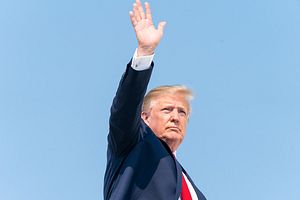On Wednesday, the United States and China held trade talks in Shanghai. It was the first round of negotiations since talks fell apart in May, after U.S. President Donald Trump accused Beijing of reneging on its commitments and broke the previously declared “truce” by upping tariffs on Chinese goods. Trump and Chinese President Xi Jinping agreed to restart talks after a face-to-face on the sidelines of the G-20 summit in Osaka at the end of June. The Shanghai meeting, headed by Trade Representative Robert Lighthizer and Treasury Secretary Steven Mnuchin on the U.S. side and Vice Premier Liu He and Commerce Minister Zhong Shan on the Chinese side, made good on that agreement.
But any sense of relief from external observers was short-lived. Less than a day after the White House called the Wednesday talks “constructive,” Trump took to Twitter to announce that he would be rolling out new 10 percent tariffs on $300 billion worth of Chinese goods – effectively placing tariffs on every single export China sends to the United States.
Trump’s latest tweetstorm was a case study in contradictions. He started by repeated the White House assessment that Lighthizer and Mnuchin “had constructive talks” in China, but then immediately began listing examples of broken deals with China:
We thought we had a deal with China three months ago, but sadly, China decided to re-negotiate the deal prior to signing. More recently, China agreed to… buy agricultural product from the U.S. in large quantities, but did not do so. Additionally, my friend President Xi said that he would stop the sale of Fentanyl to the United States – this never happened, and many Americans continue to die!
The strong implication is that the United States cannot trust what China’s representatives say in negotiations.
Trump then announced that, as of September 1, the U.S. would be “putting a small additional Tariff of 10% on the remaining 300 Billion Dollars of goods and products coming from China into our Country.” The U.S. president had threatened to do this back in May, when he bumped tariffs to 25 percent on $250 billion worth of Chinese goods, but walked that back after his meeting with Xi in Osaka. The move to reinstate the tariffs now thus calls into question the short-lived truce reached on June 29.
Yet Trump pointedly did not call off the talks (although China very well might in response to the latest broadside). In fact, his final tweet on the subject struck an incongruously positive note: “We look forward to continuing our positive dialogue with China on a comprehensive Trade Deal, and feel that the future between our two countries will be a very bright one!”
The overall impression is that Trump is trying to downplay what should be understood as a power play to force more concession from China. Xi is not likely to be mollified by Trump’s positive thoughts, or the consolation that the new tariffs are “small.” Instead, this will be viewed as a betrayal of the consensus reached with Xi – and that after, from China’s perspective, several previous examples of Trump unexpectedly pulling the rug out from under negotiations even as talks seemed to be progressing.
As of Wednesday the next round of talks were tentatively set for September in the United States. In fact, before Trump’s Twitter announcement China’s Ministry of Commerce told reporters that “Chinese and U.S. negotiating teams will maintain close communication and intensify trade consultations at the work level in August to prepare for the meeting of chief trade negotiators from both sides in September,” according to Xinhua.
Now, it’s an open question whether China will see any value in sitting down to talk at all. The new tariffs, coming just a day after a meeting between the two sides, would definitely violate China’s bottom line of having the U.S. “show sufficient sincerity, properly resolve China’s core concerns, and make joint efforts with China to seek solutions on the basis of equality and mutual respect.”

































